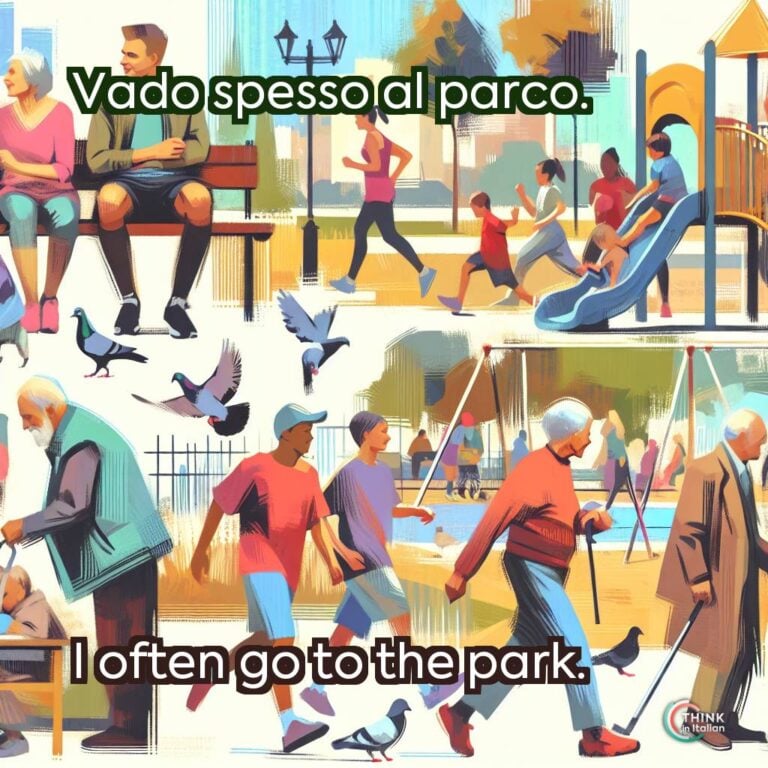How Many Verb Tenses Do You Need?
Italian conjugation tables look intimidating.
They show off tenths of tenses, and you feel like you’ll never master them.
However, the good news is that you only need a fraction of those tenses.
Namely, you should learn these 4 common tenses:
- Presente (present tense);
- Passato prossimo (past tense);
- Imperfetto (past tense for repeated actions or situations);
- Futuro (future tense).
Italian verbs list
Here’s a collection of 10 common verbs conjugated in the present tense.
Verbs 1-4 are regular, while verbs 5-10 are irregular.
Click each verb to see more tenses.
- amare
- credere
- dormire
- finire
- essere
- avere
- andare
- stare
- dare
- fare
10 basic Italian verbs: present tense
First 5 basic Italian verbs:
| amare | credere | dormire | finire | essere | |
| io | amo | credo | dormo | finisco | sono |
| tu | ami | credi | dormi | finisci | sei |
| lui / lei / Lei | ama | crede | dorme | finisce | è |
| noi | amiamo | crediamo | dormiamo | finiamo | siamo |
| voi | amate | credete | dormite | finite | siete |
| loro / Loro | amano | credono | dormono | finiscono | sono |
Another 5 common Italian verbs in the present tense:
| avere | andare | stare | dare | fare | |
| io | ho | vado | sto | do | faccio |
| tu | hai | vai | stai | da | fai |
| lui / lei / Lei | ha | va | sta | dà | fa |
| noi | abbiamo | andiamo | stiamo | diamo | facciamo |
| voi | avete | andate | state | date | fate |
| loro / Loro | hanno | vanno | stanno | danno | fanno |
For example:
Luca dorme sempre tardi.
Luca always sleeps late.
Avete fame?
Are you hungry?
Oggi sto veramente male.
I’m very sick today
But how about the more complex tenses? Here is what you can do for them.
The past historic
Passato remoto in Italian.
This is equivalent to simple English past (‘I did’; ‘he went’; ‘she ate’).
Past history is extensively used in Italian literature. Novels are usually written in this tense.
However, I do not recommend learning passato remoto because you never use it in conversation, and you can always guess the meaning when you see it in a text.
The imperative
An imperative is a form of the verb used when giving orders and instructions.
In Italian, you give instructions or orders to someone by adding the appropriate endings to the main verb stem.
To make suggestions (let’s; shall we?), the noi form of the imperative is used.
To tell someone not to do something, non is used with the imperative, except in the case of a person you call tu, when non is used with the infinitive.
The conditional
The conditional is used to talk about things that would happen or could be true under certain conditions, for instance, ‘I would help you if I could’.
Its conjugation is usually regular and thus easy to learn.
In any case, you can often get by without this tense just by adding vorrei (I’d like to) in front of the verb.
The subjunctive
The subjunctive is a different tense used in unreal or hypothetical situations, often after certain impersonal expressions and after verbs expressing desire, will, preference, opinions, and feelings.
Usually, there will be che (‘that’) between the expressions and the subjunctive.
Many students are terrified by this tense. Indeed, it’s complicated to use correctly.
Even Italian native speakers make mistakes and are laughed at for that.
So, you shouldn’t take it too hard when you make mistakes!
Review of 6 online conjugators
There’s an ample choice of Italian verb conjugators online:
As if I hadn’t repeated that enough, let me tell you that you don’t need conjugation tables.
You need to put words in context, including verbs.
For this reason, I don’t recommend using any Italian verb conjugator. No matter how well-designed they are. Even if they’re available for free.
Those conjugation tables might look reassuring because they give a sense of order, but they’re actually a hindrance to fluency.
Is it really difficult to learn Italian verbs?
You might have heard that Italian learning verbs are very difficult.
Let me tell you; it really depends on how you decide to take it.
Your attitude can be your best or worst friend when it comes to learning Italian verbs.
If you decide to learn traditionally, you’ll find it difficult, time-consuming, and boring.
But why not learn them with games, music, movies, etc.?
Once you start to understand the patterns of the most common Italian verbs, it’s actually pretty easy.
4 tips for mastering Italian verbs
In this lesson, I will show you some handy tips and tricks to help your regular verb and irregular verb learning process go more smoothly and progress more quickly.
These are some great ways to help the conjugations stick in your memory.
The ideas I’m about to share will be helpful not only for the present tense but also for the more advanced tenses you need to learn.
Start applying these habits early in your language learning, and you’ll lay the foundations for success in Italian.
By the way, if you need an extra boost to help you learn and master Italian grammar, then check out my collection of Italian grammar lessons.
Practice the ‘I’ and ‘you’ forms first
In day-to-day conversations, we usually talk about ourselves or our conversation partners.
“io” and “tu” are the forms that you will probably be using the most.
If you want to jump-start your ability to communicate in Italian, this is the best place to start.
Of course, you’ll eventually need the other forms too, but it’s best to prioritize the most commonly used forms first.
If you are comfortable with the forms you need most, you’ll feel more comfortable practicing.
Practicing is the key!
Practice in real life
Spaced repetition is key to mastering grammar patterns.
You can do that by yourself with Italian audio lessons like Ripeti Con Me or with people.
Both options are also excellent sources of comprehensible input.
On the other side, don’t just repeat flashcards!
Flashcards are no good if you still freeze up when you are asked a question.
Likewise, if you practice Italian conjugation without studying, you run the risk of practicing incorrectly, which can lead to lots of confusion and bad habits.
You need to find a good balance of study through exercise/repetition and real-world practice.
Focus on important irregular verbs
There aren’t that many irregular verbs in Italian, but I recommend seeking them out and committing them to memory before you begin seriously studying regular conjugations.
This way, you won’t be tempted to conjugate irregular verbs the regular way.
You’ll also notice that there are a handful of irregular verbs that are among the most commonly used in the entire Italian language.
Mastering these early on is key to building a strong foundation in the language.
Don’t overthink it
Since Italian verbs follow such consistent patterns, sometimes your mouth knows what to say before your brain does.
Follow those impulses because, usually, they’re right.
On the rare occasion that you realize afterward you used the wrong conjugation, you’ll usually still have communicated your point, and you can correct it next time.
Ripeti Con Me is excellent because it compels you to think directly in Italian.
Stop studying conjugations, start speaking
My experience in language learning convinced me that the deliberate study of Italian verb conjugation tables doesn’t work.
No amount of studying, reviewing, or memorizing enabled me to learn these endings.
On the contrary, learning Italian verbs can be severely retarded by an effort to try to ace these tables.
The best way to get good at it, in my opinion, is not to get hung up on trying to memorize them.
The Italian audio lessons “Ripeti con me!” are designed based on my experience and aim at practicing speaking and thinking directly in Italian.
You’ll learn important Italian verb conjugation rules naturally, almost unconsciously.
If you want to know more, I recommend reading our insightful guide to learning Italian verb conjugations.
Instead, if you want to learn more Italian vocabulary, check out this post.






